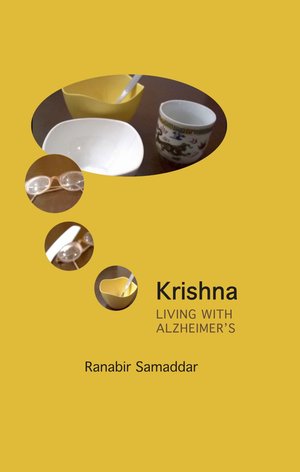Ranabir Samaddar's Krishna: Living with Alzheimer's (2015)
Krishna could not forget that she had had a severe fall. After we brought her home in March 2009, we noticed how she always extended her hands when we made her stand. She would be helped to stand straight by the physiotherapist, Prasanta, with her back to the almirah near her bed. She would try, but always lean forward to hold Prasanta’s hands or clutch his shirt pocket. Likewise, when she was carried to the bathroom or to her chair in front of the television. Not once did we have an accident because of her dropping her arms. One summer holiday in 2012, we were preparing to carry her down the stairs to take her out into the garden nearby. Rinku and the other girl were standing outside the main door, holding Krishna upright, while I locked the door. I told them, “Do not start taking her down till I descend a few steps and stand in front of you on the stairs,” so that I would be prepared if by chance their hands or feet slipped and she fell. As I was going down with my back to Krishna, she cried out in disbelief and some panic, “Ei je, kothay jaccho?” (Hey, where are you going?). We were taken aback by the clarity of the sentence, by her power of cognition, and of the fact that I was going down the stairs while she was still standing. The women comforted her and told her we would never leave her behind. But greater surprise was in store for us. After we came back that evening, we were lifting her from the wheelchair and preparing to carry her up. As the girls lifted her, she cried out, “Pore jabo” (I will fall!). Rinku had to again reassure her, “Na, Didi, porbena, amra achi to.” (No, Didi, you will not fall, we are here).
It is this subjectivity with which we have to come to terms and shape our responses accordingly. We shall then be able to make the life of an Alzheimer’s patient not only bearable but happy, to a certain extent.
A key question is: Did we derive happiness, and were we relaxed when Krishna was relaxed and happy? Or were we in a permanent state of gloom because she was ill and had a limited span of life? The unambiguous answer is that we were happy if she was, anxious if her condition deteriorated, and lonely if she had been taken to hospital… We were not like the doctors who were always surprised that she was still alive, and made a point of telling me that they were impressed with her “staying power”, by which I presume they meant her resilience. We were also not like some of our friends and relatives who always displayed pity or sympathy for me, for the “great burden” I was carrying.
